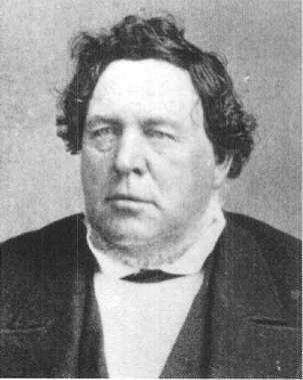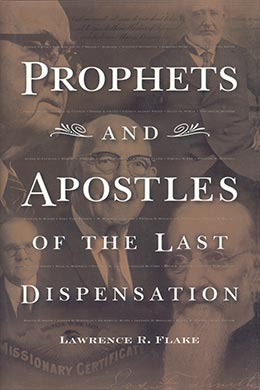George Albert Smith
Lawrence R. Flake, Prophets and Apostles of the Last Dispensation (Provo, UT: Religious Studies Center, Brigham Young University, 2001), 173–75.

Born: 26 June 1817, Potsdam, New York
Quorum of the Twelve Apostles: 26 April 1839 (age 21)
First counselor to President Brigham Young: 7 October 1868
Died: 1 September 1875 (age 58), Salt Lake City, Utah
O sinner, I seal you up to eternal damnation!” Nine times this and similar condemnations were directed at fourteen-year- old George Smith by the fiery revival preacher, Reverend Cannon, in consequence of young George’s refusal to come forward and be saved. [1] Somehow the spirit that had attracted many of the other young residents of Potsdam, New York, had not affected George. Perhaps it was because of the Book of Mormon, which his cousin Joseph claimed to have translated. George had never met Joseph, but when his uncle Joseph Smith Sr. and cousin Don Carlos Smith had come to Potsdam a few months earlier, they had left a copy of the strange book. Although George did not profess to believe it, he found himself defending the book when others spoke evil of it. When some Mormon missionaries called again in 1832, George and his parents joined the Church and soon after moved to Kirtland, much to the joy of the Prophet Joseph and his father.
The young man quickly involved himself in the work of the Church, hauling stone for the temple, marching with Zion’s Camp, being ordained a seventy at the age of seventeen, and filling a mission to the East a few months later. After moving to Missouri in 1838, George served another mission to Tennessee and Kentucky, and on 26 April 1839 in an early morning meeting at the site of the temple at Far West, twenty-one-year-old George A. Smith was ordained an apostle. Soon afterward he departed with most of the members of his quorum to carry the gospel to Great Britain. Three weeks after his return, in July 1841, he married Bathsheba W. Bigler, the first of his seven wives. Elder Smith became the father of twenty children. He was the son of “Uncle John Smith,” the patriarch. One of his sons, John Henry, became a member of the Twelve and father of George Albert Smith, the eighth president of the Church.
A great bond of love existed between George and his cousin Joseph. On one occasion George recorded, “Joseph wrapped his arms around me, and squeezed me to his bosom and said, ‘George A., I love you as I do my own life.’ I felt so affected, I could hardly speak, but replied, ‘I hope, Brother Joseph, that my whole life and actions will ever prove my feelings, and the depth of my affection toward you.’” [2]
Because of his loyalty to the Prophet and perhaps because of his size (although he weighed only four pounds at birth, he grew to be a man of nearly three hundred pounds), “George A.” served as a bodyguard for Joseph Smith and later for Brigham Young.
Elder Smith was part of the original pioneer company to go to Utah and explore the valley two days before President Young’s arrival. At Winter Quarters, where he left his family while making this first trek, he buried one of his wives and four of his children. Because he often encouraged the Saints waiting to come to the valley to plant potatoes and because he planted the first ones in Utah himself, he was dubbed “the Potato Saint.” A diligent colonizer, Elder Smith is recognized as the father of many settlements in Southern Utah. The largest of these was named in his honor—St. George.
Active in public affairs, he was a lieutenant-general in the territorial militia and was elected senator in the territorial legislature, serving in every session except one, which was held while he was away. In 1856 he traveled to Washington with John Taylor to work for statehood. For sixteen years, beginning in 1854, he served as Church Historian and Recorder, and in 1868 became first counselor to President Young. In this capacity he visited the Saints in the United States and Europe. A very popular speaker, he preached over four thousand sermons. “Short prayers, short blessings, short sermons, full of the spirit” is how one listener described Elder Smith’s public pronouncements. When George A. Smith died at the age of fifty-eight, President Young called him “as faithful a boy and man as ever lived.”[3]
Notes
[1] Journal of Discourses, 5:105–6.
[2] History of the Church, 5:391.
[3] Matthias F. Cowley, Prophets and Patriarchs of the Church of Jesus Christ of Latter-day Saints (Chattanooga, TN: Ben E. Rich, 1902), 146.
